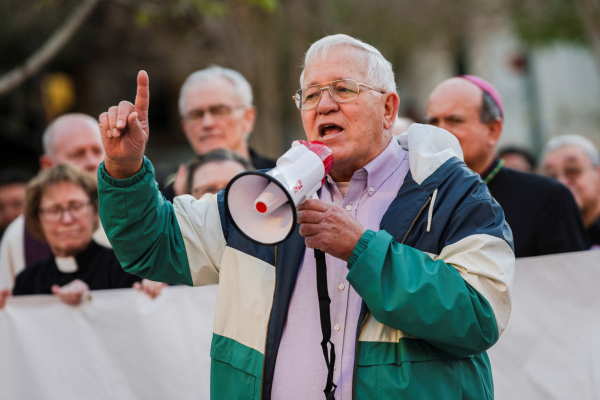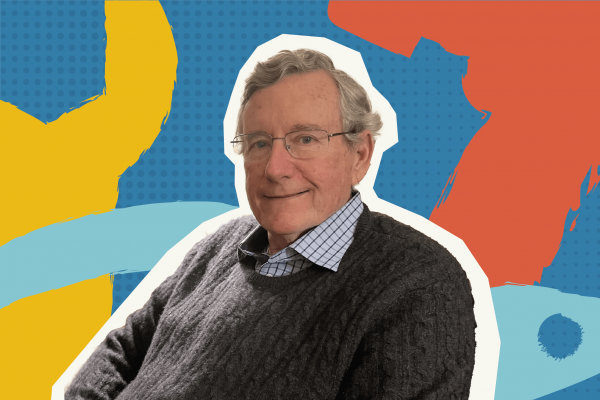During my time as a volunteer jail chaplain, my favorite thing to do was anoint people with oil. We would wait while people lined up in dorms or we would reach through bars along the rows of cells, making the sign of the cross on their foreheads. “As this holy oil anoints your forehead,” I would say, “may the Holy Spirit dwell in your heart and give you peace.”
These encounters were powerful, but they were ephemeral. In our brief interactions with the people behind bars, we did not change their material conditions. On top of that, I would only see people once or twice because of how frequently the jail population changes; between the background noise of TVs and my own bad memory, I would almost never remember their names.
Yet, I believe these moments of presence and touch, of bearing witness to people’s humanity and their suffering, teach us how to wait for God and God’s justice during Advent. I also believe that these moments must be tied more closely to building ongoing relationships and engaging in transformative social change to help us “prepare the way for the Lord.”
My favorite passage of scripture for Advent is Isaiah 40:1–5. In these verses, the themes of comfort, preparing a way, and reversals of power resonate with the revolutionary work of bearing witness in our modern world. These verses also show us where to turn our attention as we prepare for Jesus’ coming:
Comfort, O comfort my people,
says your God. (Isaiah 40:1)
The comfort I could offer by being present with people in jail was only a glimpse into the deeper ministry of full-time chaplains, who visit people regularly, offering comfort and a listening ear. The real power of chaplaincy, mutual aid, and outreach work is in building relationships.
Outreach to unhoused encampments relies on volunteers building trust by getting to know the folks they are providing supplies for. The reality is that providing food and survival supplies matters to unhoused people, but the most powerful benefit comes from simply building relationships with one another. These relationships provide the means for people to reach out when they are in crisis or need additional assistance.
Presence and relationship are the contexts for comfort. This is the difference between offering occasional religious services for people in prisons or just providing supplies for unhoused people: Offering comfort to people is about meeting people where they are and building relationships with them. In these relationships, we receive comfort, too.
God’s promise in Advent is about meeting us wherever we are. We, too, can go out and build relationships with all our neighbors — housed or unhoused, incarcerated or not — as we prepare for a future where all people can be comforted.
A voice cries out: “In the wilderness prepare the way of the Lord;
make straight in the desert a highway for our God.” (Isaiah 40:3)
The wildernesses are the places in our cities and communities that feel hopeless and abandoned or where change seems hardest. These are the places we prepare the way of the Lord, offering comfort to all who need it and receiving comfort in return.
The “wilderness” of homelessness is not only caused by the economic conditions that deprive people of housing, but also by ongoing policy choices which are counterproductive and cruel. For example, New York City Mayor Eric Adams recently proposed that mentally ill, unhoused people be involuntarily committed, raising immediate concerns about civil rights violations from disability and civil rights groups.
In Los Angeles, a recent L.A. Taco report on the CARE/CARE+ program — a city program primarily known for “sweeping” encampments of unhoused people for the purported purpose of sanitation concerns — found that only 63 people out of 30,000 who were harassed and displaced by the sweeps were then placed into permanent housing. These sweeps often took essential possessions from unhoused people.
Working in this context of the wilderness often feels like what the co-founder of Partners in Health, Paul Farmer, called “fighting the long defeat.” Considering only 63 out of the 30,000 people who were affected by this program made it into permanent housing, what can our efforts at outreach and community building actually accomplish?
There are signs of hope politically speaking. For example, here in L.A., the election of several progressive and leftist leaders to city government brings about the possibility of more humane approaches to homelessness and public safety. As various sources confirmed to L.A. Taco, in order for outreach to be effective at getting people into housing, working slowly and deliberately is key. This work takes “ample time, commitment, and trust.” The on-the-ground work of changing the status quo and offering comfort to those in the wilderness requires a commitment to this slow work.
The season of Advent makes evident the contrast between the slow work of “making straight” in the “desert a highway” through compassionate, patient engagement versus the more common and expedient work of bulldozing homes, sweeping encampments, and criminalizing homelessness. Both of these may be ways of “making a highway” but only one of them prepares a highway for God.
Every valley shall be lifted up,
and every mountain and hill be made low. (Isaiah 40:4)
Making a highway for God requires us to bring about lasting justice and care. But what does this look like practically speaking? I’d argue that we bring about lasting justice by practicing the slow work of presence, comfort, and solidarity, which follows the model of mutual aid. Mutual aid focuses on empowering people and communities to act for their own safety by collectively gathering resources and relying on local leaders to solve issues of injustice.
In the case of homelessness, outreach efforts don’t just put volunteers in touch with the people they serve but draw on those in local unhoused communities as valuable leaders and co-laborers. De facto leaders in particular encampments are sources of wisdom, care, and safety for those around them. Efforts that build on those relationships respect the dignity of the communities that already exist; efforts to build trust and support with marginalized people must also always extend to supporting self-advocacy, even when that advocacy takes the form of protests that might make more privileged people feel uncomfortable.
In the case of prison and police abolition, slow work can take the forms of restorative and transformative justice practices that engage holistically with people in situations of harm. It can also take the form of investment in communal care, empowering people to build their own safe communities.
Solidarity means turning power relations upside down, prioritizing the voices of the most marginalized, and meeting people’s needs rather than imposing values upon them. Transformative change that “lifts up valleys” and “casts down mountains” begins with seeing marginalized people as individuals with particular, distinct needs and empowering all communities to pursue their own healing.
Then the glory of the Lord shall be revealed,
and all flesh shall see it together. (Isaiah 40:5)
Ultimately, the promise of Advent is about the glory of God becoming visible to all communities. When we bear witness to one another, we make God present. We make present the glory of God that underlies transformative change when we comfort each other and make a path in the wilderness. The promise that “all flesh shall see it together” reminds us that bearing witness to everyone’s innate dignity and hope in life, even amid suffering, is itself transformative work. This transformative work occurs even when its effects are not obvious or even when our contact with people in need of comfort is brief.
A key insight of organizing is that it begins with knowing and caring for your neighbors. As abolitionist Benji Hart writes, “I picture myself knowing all my neighbors’ faces; I picture myself having relationships with each of them, even if they are not all perfect ones.” From the briefest moments of healing touch, oil on flesh, to the long-term, imperfect relationships built in our communities and our work, our witnessing of one another’s humanity lets all flesh show forth the glory of the coming peaceful and just reign of God.
Got something to say about what you're reading? We value your feedback!







